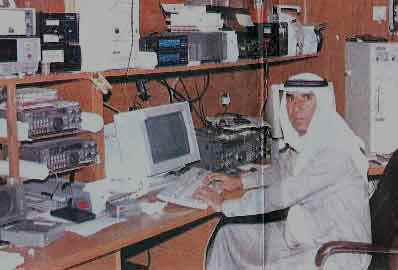Following is a reproduction of the article "The last voice: The Ham who made the world a witness" by Gail Seery published in the February 26, 1997 issue of the ARAB TIMES/SPECIAL SECTION. I am grateful to my friend OM Balasubramanian, VU2UYC, who sent me a copy of the Arab Times.
The last voice: The Ham who made the world a witness
From the basement of
his home in Salwa, just a stone's throw from an Iraqi occupied police station, and near
two occupied schools, Abdul Jabbar Marafie (Call-sign: 9K2DZ, 1992
ARRL HUMANITARIAN AWARD WINNER) kept up his radio transmissions from the first
day of the invasion until the liberation of Kuwait.
August 2nd, 1990, the
day of the Iraqi invasion, found many residents outside Kuwait, taking their summer
vacations, travelling on business, or having medical treatment. On the first morning it
was difficult, but still possible to find a telephone line into Kuwait, albeit after hours
of trying.August 2nd, 1990, the day of the Iraqi invasion, found many residents outside
Kuwait, taking their summer vacations, traveling on business: or having medical treatment.
On that first morning it was difficult, but still possible to find a

telephone line into Kuwait, albeit after hours of trying. Things quickly became worse. The lines were cut altogether, and there was no way of knowing how family and friends fared inside the country, nor when the telephone lines would be restored. For many it was the doubt and the total lack of relevant information, which was the hardest to bear and the majority of people had to resign themselves to months of waiting for news, with no news coming. However, many others were able to pass messages in and out of Kuwait, through one brave man and an impromptu network, encompassing countries as far distant as Pakistan and Guatemala, which grew around his transmission outside Kuwait. is a most reluctant hero, and has received little acclaim for his work from within Kuwait. That doesn't bother him particularly. He feels the most important thing is to know that he did all he could to help as many people as he could from a wide number of different nationalities and backgrounds. That he continually risked his own life in order to do so, seems virtually irrelevant to him. "I don't like to be called a hero," he says, adding that he only did what he felt he had to do.
Want to read the FULL STORY?